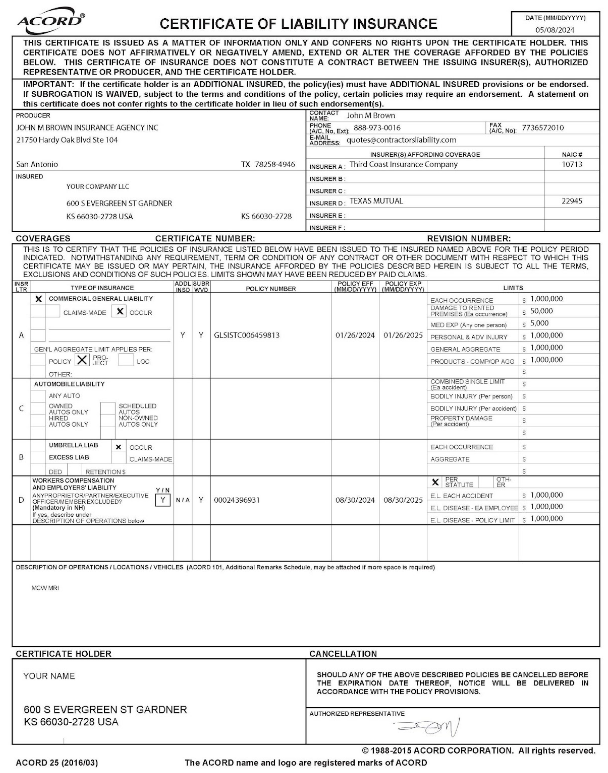In Kansas, contractor licensing requirements vary depending on the local jurisdiction. Kansas does not have a statewide licensing requirement for general contractors, meaning contractors need to check with individual cities and counties for specific guidelines. However, some specialized trades, such as electrical, plumbing, and HVAC, require state-level licenses. Additionally, obtaining a license often involves paying all necessary application and licensing fees, which are crucial financial obligations in the process. Here’s a quick overview of the process:

Determine Your Jurisdiction’s Requirements
Since Kansas regulates contractor licensing at the local level, the first step is to contact your city or county’s building department to determine the specific requirements for obtaining a contractor license.

General Contractor License
Most jurisdictions require a license for general contractors working on projects above a certain dollar amount. Be sure to review local guidelines to ensure compliance. Different classes of licenses, such as the ‘building contractor’ and ‘building contractor license’, specify the scope of work allowed, including construction, remodeling, and demolition of structures based on height restrictions.

Specialty Trades
If you’re doing specialized work like electrical, plumbing, or HVAC, you may need to get a state-issued license. Requirements are experience verification, pass an exam and meet insurance obligations.

Renewals
Contractor licenses are typically renewed annually or biennially, depending on the jurisdiction. Regular renewals ensure compliance with local regulations.
Licensing Authorities in Kansas
For contractor licensing information in Kansas, here are the key details along with contact information:
Wichita:
Wichita-Sedgwick County Metropolitan Area Building and Construction Department
Web: Wichita.gov
Alternate Phone Number: 512-463-6599 (For calls outside Texas)
Alternate Phone Number: 512-463-6599 (For calls outside Texas)
Phone: (316) 660-1840
Alternate Phone Number: 512-463-6599 (For calls outside Texas)
Alternate Phone Number: 512-463-6599 (For calls outside Texas)
Address:
Main Office: 271 W. 3rd St., Wichita, KS 67202
Kansas City:
Kansas City, Kansas Building and Development Services
Web: WycoKCK.org
Alternate Phone Number: 512-463-6599 (For calls outside Texas)
Alternate Phone Number: 512-463-6599 (For calls outside Texas)
Phone: (913) 573-8620
Alternate Phone Number: 512-463-6599 (For calls outside Texas)
Alternate Phone Number: 512-463-6599 (For calls outside Texas)
Address:
Main Office: 701 N. 7th St., Kansas City, KS 66101
Topeka:
Topeka Building and Safety Department
Web: Topeka.org
Alternate Phone Number: 512-463-6599 (For calls outside Texas)
Alternate Phone Number: 512-463-6599 (For calls outside Texas)
Phone: (785) 368-3704
Alternate Phone Number: 512-463-6599 (For calls outside Texas)
Alternate Phone Number: 512-463-6599 (For calls outside Texas)
Address:
Main Office: 620 SE Madison St., Topeka, KS 66607
Types of Contractor License in Kansas
- Class A (General Contractor): Required for professionals working on large-scale commercial and residential projects.
- Class B (Building Contractor): Focuses on commercial and residential buildings, including inspections and safety protocols.
- Class C (Residential Contractor): For contractors handling residential projects, including new builds and renovations.
- Specialty licenses are available for specific trades such as electrical, plumbing, and HVAC.
General Liability Insurance and Bonding Requirements for Kansas Contractors

General Liability Insurance
Contractors in Kansas are usually required to carry general liability insurance. Coverage typically ranges from $300,000 to $1 million, depending on the jurisdiction and type of work being performed. GL insurance premiums for contractors typically range from $700 to $2,500 annually, based on coverage levels and business size.

Workers’ Compensation Insurance
If you have employees, you must carry workers’ compensation insurance to cover any injuries that occur on the job. Contractors must provide proof of both general liability and worker’s compensation insurance as part of their licensing application, ensuring these insurances are obtained from licensed companies.
See the Official Document:


Surety Bonds
Contractors may need to purchase surety bonds with premiums ranging from 1% to 5% of the bond amount. For example, a $10,000 surety bond would cost between $100 and $500 per year.
Application and Licensing Fees and Insurance Costs
In Kansas, license application and licensing fees for businesses can vary significantly depending on several factors:
- Jurisdiction: Different cities and counties may have varying fee structures.
- Scope of Work: The complexity and scale of your business operations can influence the cost.
- License Classification: Specific industry categories may have different fee levels.
Typically, license application and licensing fees in Kansas range from $100 to $500. However, it’s important to note that this is just a general range, and actual costs can fall outside these boundaries depending on your specific circumstances.
If you’re a contractor in Kansas, navigating the licensing and insurance process can be complex. Effective exam prep courses are crucial for successfully passing the licensing exams. For further assistance with meeting Kansas licensing requirements and securing the appropriate insurance coverage, visit Contractors Liability for expert guidance and solutions.
Before applying for your license or insurance, double-check your local jurisdiction’s specific requirements to ensure you meet all regulations. Designating a ‘qualified person’, such as a master license holder or business owner, is crucial for formalizing the authority to conduct business activities like pulling permits and scheduling inspections. Keeping up with renewals and ensuring you’re properly insured will help protect your business and ensure compliance with Kansas laws.
Frequently Asked Questions (FAQ)
These are common questions about General Contractor License in Kansas
No, Kansas does not have a statewide contractor’s license. Licenses are issued at the local level, and requirements may vary depending on the city or county.
Trades like electrical work, plumbing, landscaping, asbestos removal, lead abatement, and underground oil tank removal require licenses.
Contractors generally need general liability insurance, ranging from $300,000 to $1 million, and workers’ compensation insurance if they have employees.
Yes, surety bonds may be required for certain projects or by specific localities to guarantee contract fulfillment.
Yes, contractors must follow the Maine Uniform Building and Energy Code (MUBEC) and any additional local codes.
Contractors need to apply for permits from local authorities, often submitting detailed project plans for approval.

